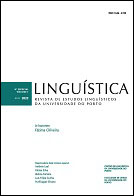Generalizing self-reference with "a pessoa" ('the person'), "uma pessoa" ('a person') and other referentially vague human names
Abstract
This article analyzes data extracted from the Syntax-oriented Corpus of Portuguese Dialects (CORDIAL-SIN) and Corpus Africa with the aim of demonstrating that the arbitrary/indefinite expressions uma pessoa and a pessoa convey first-person-based genericity, that is, what Moltmann (2010) calls ‘generalizing detached self-reference’. Differences in contextual adequacy between uma pessoa and a pessoa are then discussed using intuitive data. It is suggested that such distributional differences are a consequence of the greater interpretative flexibility of a pessoa (which allows an inclusive or exclusive reading) relative to uma pessoa(which only allows an inclusive reading). Finally, the geolinguistic distribution of uma pessoaand a pessoa in the Portuguese territory is compared to the geolinguistic patterns found for other expressions with human general nouns that also seem to convey generalizing detached self-reference (i.e. homem, fulano, fulana, gajo, tipo, indivíduo, mulher).
References
Amaral, E. T. R., & Oliveira, F. C. de. (2019). A influência de fatores semânticos no uso de nomes gerais para a indeterminação do sujeito. Acta Scientiarum. Language and Culture, 41(1). https://periodicos.uem.br/ojs/index.php/ActaSciLangCult/article/ view/44977
Amaral, E., & Mihatsch, W. (2019). Incipient impersonal pronouns in colloquial Brazilian Portuguese. In P. Herbeck, B. Pöll, & A. C. Wolfsgruber (Eds.), Semantic and syntactic aspects of impersonality (pp. 149-185). Buske.
Carvalho, J. (2019). Teasing apart 3rd person null subjects in Brazilian Portuguese. In I. Feldhausen, M. Elsig, I. Kuchenbrandt, & M. Neuhaus (Eds.), Romance Languages and Linguistic Theory 2016. Selected papers from ‘Going Romance’ 30 Frankfurt (pp. 237-254). John Benjamins.
Castroviejo Miró, E. (2008). Deconstructing Exclamations. Catalan Journal of Linguistics, 7, 41-90.
Costa, J., & Pereira, S. (2013). A Gente: pronominal status and agreement revisited. The Linguistic Review, 30(2), 161-184.
Malamud, S. A. (2012). Impersonal indexicals: one, you, man and du. The Journal of Comparative Germanic Linguistics, 15(1), 1-48. https://peeps.unet.brandeis. edu/~smalamud/malamud-JCGL-web-draft.pdf
Malamud, S. A. (2013). (In)definiteness-driven typology of arbitrary items. Lingua, 126, 1-31. https://www.researchgate.net/publication/256806415_Indefiniteness-driven_ typology_of_arbitrary_items
Martins, A. M., & Nunes, J. (2021). Brazilian and European Portuguese and Holmberg’s 2005 typology of null subject languages. In S. Baauw, F. Drijkoningen, & L. Meroni (Eds.), Romance Languages and Linguistic Theory 2018: Selected papers from ‘Going Romance’ 32, Utrecht (pp. 171-190). John Benjamins.
Moltmann, F. (2006). Generic One, Arbitrary PRO, and the First Person. Natural Language Semantics, 14(3), 257–281.
Moltmann, F. (2010). Generalizing Detached Self-Reference and the Semantics of Generic One. Mind & Language, 25(4), 440–473. doi:10.1111/j.1468-0017.2010.01397.
Pinto, C. (2019). Os múltiplos valores do item homem no Português Antigo. In E. Carrilho, A. M. Martins, S. Pereira, & J. P. Silvestre (Eds.), Estudos Linguísticos e Filológicos Oferecidos a Ivo Castro (pp. 1147-1180). Centro de Linguística da Universidade de Lisboa. https://repositorio.ul.pt/handle/10451/39619
Pinto, C. (2021). Minimizers and the Syntax of Negation: A diachronic and comparative approach from European Portuguese [Tese de doutoramento]. Universidade de Lisboa.
Posio, P. (2017). Entre lo impersonal y lo individual. Estrategias de impersonalización individualizadoras en el español y portugués europeos. Spanish in Context, 14(2), 209-229.
Posio, P. (2021). A pessoa and uma pessoa: grammaticalization and functions of a human impersonal referential device in European Portuguese. Journal of Portuguese Linguistics, 20(1). https://jpl.letras.ulisboa.pt/article/id/5682/
Downloads
Published
Issue
Section
License
Copyright (c) 2022 Linguística: Revista de Estudos Linguísticos da Universidade do Porto

This work is licensed under a Creative Commons Attribution-NonCommercial 4.0 International License.



